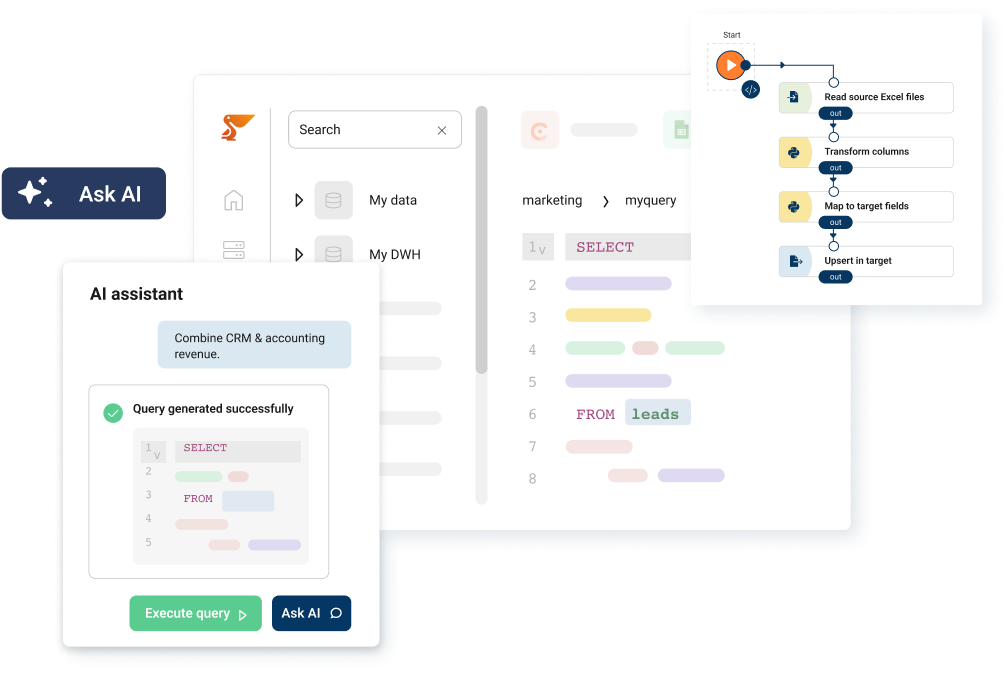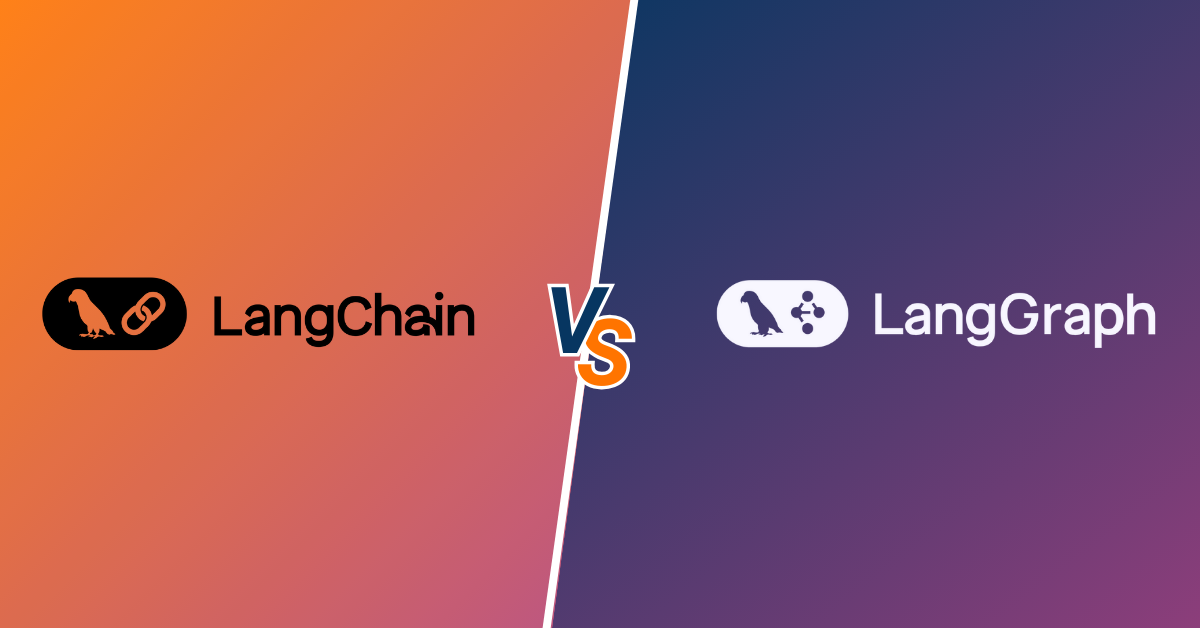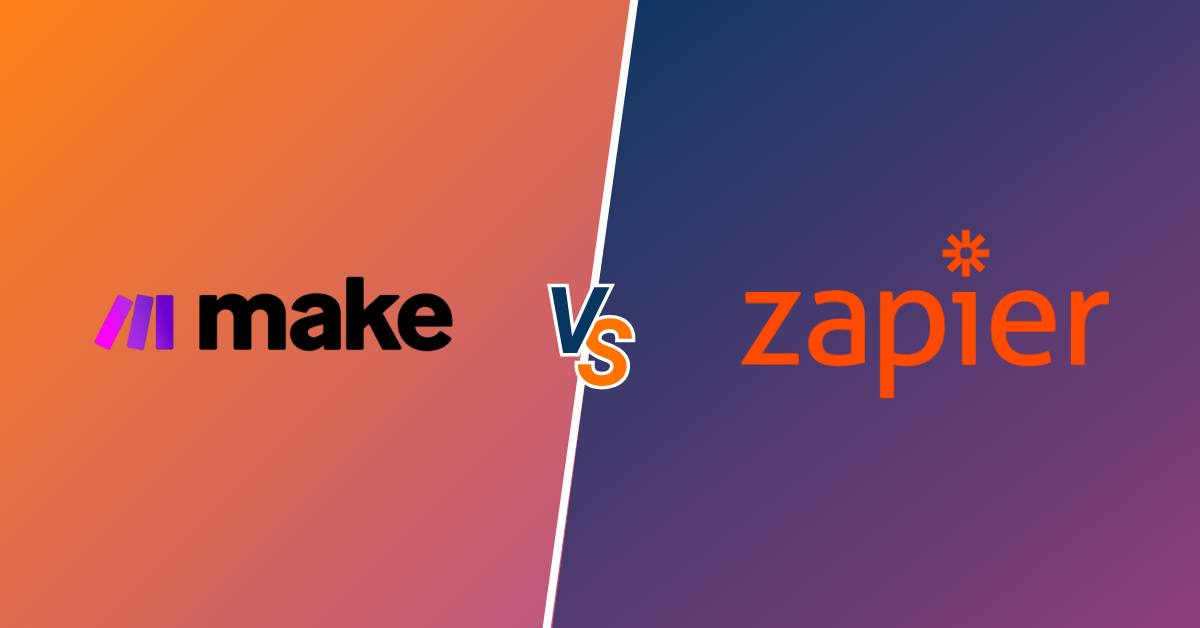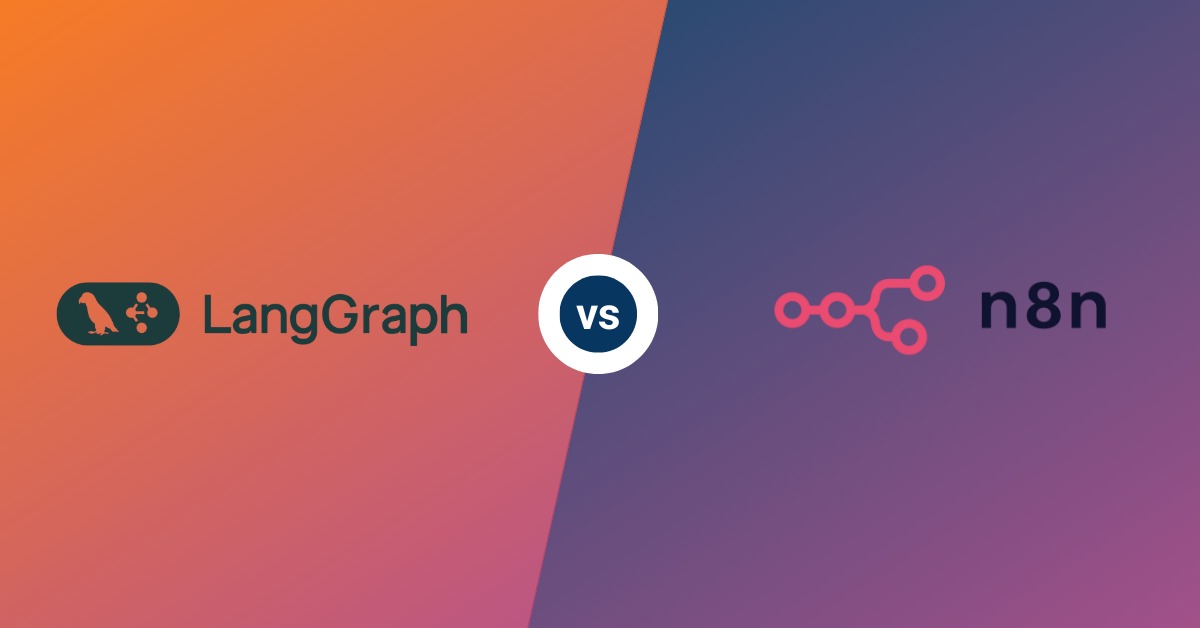As organizations scale their data operations, many CTOs reassess whether a traditional ETL tool like Azure Data Factory (ADF) remains the best fit. Azure Data Factory is Microsoft’s cloud-based ETL/ELT service, offering 90+ built-in connectors and deep integration with the Azure ecosystem for orchestrating data pipelines.
However, its consumption-based pricing (billed per activity and data movement) can lead to unpredictable costs, and complex pipelines can require significant engineering effort. ADF is also primarily a batch-oriented tool with limited built-in transformation features or downstream “activation” (e.g. reverse ETL) out of the box.
As a result, over two-thirds of organizations report evaluating alternatives to their data integration platforms due to cost, complexity, and feature needs. For example, teams often seek more predictable pricing, easier management, or integrated analytics that ADF alone doesn’t provide.
Why consider alternatives to Azure Data Factory?
Azure Data Factory enables cloud-scale ETL and ELT workflows across on-premises and cloud data sources. It provides a visual pipeline designer, scheduling, and supports many data sources (e.g. SQL Server, Salesforce, SAP). However, growing data teams sometimes find ADF’s model limiting. Its usage-based billing (per activity run and data volume) can make budget planning difficult. Complex data transformations typically require external tools (like SSIS or Databricks) rather than being handled natively.
Moreover, Azure Data Factory focuses on moving and transforming data, but lacks the broader “data activation” and analytics features (like embedded visualization or built-in warehousing) offered by some modern platforms.
In practice, this means teams may invest in multiple Azure services or custom code to fill gaps. In short, cost concerns, operational overhead, and the desire for richer features drive many CTOs to explore alternatives that promise simpler pricing, turnkey transformations, and unified data/analytics capabilities.
ADF competitors & alternatives in 2025
Below are ten leading alternatives to Azure Data Factory, including both commercial platforms and open-source projects.
Each entry summarizes what the tool is, key capabilities, and why it might be chosen (or not) compared to ADF. We include key features, typical use cases, and both advantages and drawbacks to help you make an informed choice.
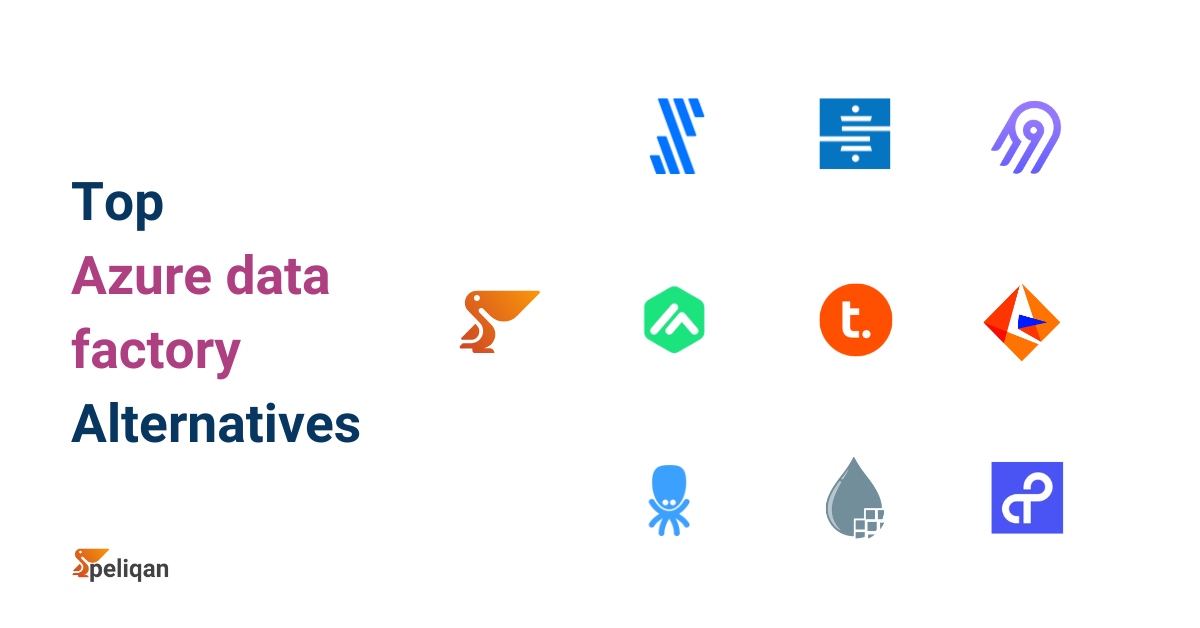
Azure Data Factory Alternatives: Top 10
1. Peliqan – All-in-One Modern Data Stack for Agile Teams
Peliqan is the #1 Azure Data Factory alternative, delivering an all-in-one, no-code/low-code modern data stack. Founded to eliminate complexity, Peliqan unifies data integration, warehousing, transformation, orchestration, and activation in a single platform designed for agile teams and CTOs seeking rapid deployment and simplicity.
Core Capabilities and Differentiators
- Fully integrated data stack: ETL, ELT, reverse ETL, BI, and activation
- 250+ connectors to databases, APIs, SaaS tools, and files
- Built-in PostgreSQL warehouse or connect your own
- Federated query engine powered by Trino
- Visual workflows + SQL + AI-based transformation
Transparent Pricing
- Starter: $380/month
- Pro: $550/month
Technical Architecture
- Cloud-native SaaS with SOC 2 Type II compliance
- Real-time federated queries across cloud and on-prem sources
- Data activation: Reverse ETL, webhooks, API publishing
- Multi-cloud support (AWS, Azure, GCP)
Why choose Peliqan: Rapid deployment, all-in-one functionality, transparent pricing, and enterprise-grade security make it ideal for modern data teams replacing Azure Data Factory.
2. Fivetran – Zero-Maintenance Enterprise ETL
Fivetran is an enterprise-grade platform offering fully automated data pipelines for organizations prioritizing reliability and minimal maintenance. With 500+ connectors, it’s ideal for teams looking to outsource schema management and updates.
Core Capabilities
- Automated schema evolution and real-time syncing
- Change data capture (CDC) support
- Comprehensive connector library for enterprise data sources
Pros
- Extremely low maintenance with auto-recovery and alerting
- Industry-leading uptime and support
Cons
- Premium pricing
- Limited custom transformations compared to ADF or Peliqan
3. Stitch – Lightweight ETL for Startups
Stitch, owned by Talend, is a developer-friendly ETL tool ideal for small to medium-sized businesses. It focuses on simplicity and ease of use, offering quick connector setups and basic data pipelines.
Core Capabilities
- Prebuilt connectors for SaaS apps and databases
- Batch data loads to warehouses
- Basic monitoring and retry logic
Pros
- Quick onboarding and setup
- Affordable pricing
Cons
- Limited data transformation features
- Not ideal for large-scale enterprise use
4. Airbyte – The Open Source Data Integration Leader
Airbyte is an open-source platform offering 600+ connectors with a strong developer community. It provides excellent flexibility for organizations wanting control over their data integration infrastructure.
Core Capabilities
- Open-source connector framework
- Self-hosted and cloud deployment options
- Support for dbt-based transformations
Pros
- Highly customizable and extensible
- Cost-effective for engineering-driven teams
Cons
- Requires DevOps and maintenance effort
- Inconsistent quality in community-built connectors
5. Matillion – ELT for Cloud Data Warehouses
Matillion is a purpose-built ELT platform designed to optimize data processing in modern cloud data warehouses like Snowflake, BigQuery, and Redshift.
Core Capabilities
- Visual ETL/ELT builder with SQL transformation support
- Push-down ELT execution model
- Integration with cloud platforms
Pros
- Warehouse-native performance
- Intuitive UI with visual orchestration
Cons
- Limited reverse ETL capabilities
- Can be expensive for scaling teams
6. Talend – The Legacy ETL Powerhouse
Talend offers robust enterprise-grade data integration, transformation, and governance capabilities. It’s known for its legacy presence and compliance-oriented features.
Core Capabilities
- Visual ETL designer
- Data quality, governance, and lineage tools
- Broad connector support
Pros
- Trusted by large enterprises
- Strong governance features
Cons
- Legacy interface and slower iteration pace
- High complexity and licensing costs
7. Informatica – Comprehensive Data Management Platform
Informatica delivers an enterprise-grade platform for data integration, quality, governance, and master data management. It’s best suited for highly regulated industries.
Core Capabilities
- Wide range of data services including MDM
- AI-powered automation
- Extensive connector ecosystem
Pros
- Highly scalable and reliable
- Strong security and compliance features
Cons
- Expensive and complex to implement
- Not optimized for agile data teams
8. Keboola – Unified Platform for Data Ops
Keboola is a data operations platform that offers ETL/ELT, orchestration, and transformation with built-in versioning and automation support for modern engineering workflows.
Core Capabilities
- Component-based integration model
- Built-in orchestration and Git integration
- Data sharing and pipeline collaboration
Pros
- Strong developer tooling and automation support
- Flexible deployment and pricing
Cons
- Not as intuitive for non-engineers
- Smaller connector catalog vs. others
9. Apache NiFi – Visual Flow-Based Programming
Apache NiFi is an open-source tool that provides visual programming for building real-time data flows, ideal for on-prem or hybrid environments.
Core Capabilities
- Drag-and-drop flow builder
- Built-in provenance tracking
- Support for IoT and edge data processing
Pros
- Real-time stream and batch processing
- Open-source and extensible
Cons
- Manual scaling and performance tuning required
- Requires infrastructure and operational support
10. Tray.ai – Low-Code Workflow Automation
Tray.ai is a general-purpose automation and integration platform with strong support for business users and low-code data flow creation.
Core Capabilities
- Low-code builder with logic-based flow controls
- Pre-built connectors for SaaS apps and APIs
- Integration with CRMs, marketing tools, and analytics stacks
Pros
- Fast prototyping for non-engineers
- Good for operational workflows
Cons
- Limited support for complex data pipelines
- Not designed for large-scale warehousing tasks
Azure Data Factory Alternatives Comparison
| Tool | Key Features | Strengths | Pricing Model | Limitations |
|---|---|---|---|---|
| Peliqan | – Unified platform with 250+ data connectors
– Built-in cloud data warehouse – Reverse ETL and real-time API publishing – Low-code Python and AI-assisted SQL |
– Combines ETL, warehousing, BI, and reverse ETL
– 10x faster setup for data teams – Transparent, startup-friendly pricing |
Starts at $350/month with unlimited users and connectors | – Newer platform still growing enterprise presence |
| Fivetran | – 500+ automated connectors
– Schema drift handling – Real-time sync and data governance – Managed pipelines with minimal maintenance |
– Enterprise-grade automation
– Proven reliability and scale – Wide integration ecosystem |
MAR-based pricing starting at ~$120/month | – Limited transformation flexibility
– Higher cost at scale |
| Stitch | – 130+ SaaS data sources – ELT with dbt integration
– Simple UI and fast onboarding – Part of Talend ecosystem |
– Easy to get started
– Cost-effective for smaller teams – Scales with Talend for enterprise use |
Free tier, paid plans from $100/month | – Limited connectors compared to larger players
– No built-in transformation engine |
| Airbyte | – 600+ open-source connectors
– AI connector builder – Self-hosted and cloud options – Reverse ETL and vector DB integration |
– Customizable and extensible
– Developer-first experience – Open-source transparency |
Free self-hosted, cloud starts at $2.50/credit | – Steep learning curve
– Connector quality varies |
| Matillion | – Visual ELT with pushdown compute
– Supports Snowflake, BigQuery, Redshift – Advanced transformation pipelines – 100+ connectors |
– Cloud-native ELT
– No infrastructure to manage – Integrated with modern data warehouses |
Credit-based model ~$2/credit | – Locked into specific cloud warehouses
– Complex pricing |
| Talend | – Comprehensive data integration suite
– Data quality and governance – API and master data management – Cloud, hybrid, and on-prem deployment |
– Enterprise-scale platform
– End-to-end data lifecycle coverage – Strong governance capabilities |
Enterprise licenses starting ~$1,170/month | – Higher setup complexity
– Requires dedicated data teams |
| Informatica | – 500+ connectors
– Master data management and quality – AI-powered metadata intelligence – Cloud-native and on-prem options |
– Trusted by Fortune 500s
– Mature ecosystem – Full-stack data management |
Starts around $100k/year for enterprise | – Expensive for mid-market
– Lengthy implementation |
| Keboola | – Modular data operations platform
– Built-in transformation and orchestration – Collaboration and governance – API-first architecture |
– All-in-one with great usability
– Developer and analyst-friendly – Transparent usage-based pricing |
Free tier, paid starts at ~$250/month | – Less visibility compared to larger vendors
– Smaller connector ecosystem |
| Apache NiFi | – Flow-based programming UI
– 200+ built-in processors – Real-time and batch processing – Strong security and audit features |
– Highly flexible and visual
– Open-source and extensible – Proven enterprise deployments |
Free OSS, infra cost varies ($300–$3,000+) | – Manual infrastructure required
– Requires engineering support |
| Tray.io | – Low-code integration platform – Workflow automation
– 600+ app connectors – Designed for business and IT users |
– Ideal for SaaS workflow automation
– User-friendly interface – Rapid deployment |
Quote-based enterprise pricing | – Not designed for large-scale data pipelines
– Limited data transformation capabilities |
Conclusion
In summary, each of these alternatives brings a different mix of capabilities that can address the gaps left by Azure Data Factory. Some (Peliqan, Matillion, Keboola) aim to provide end-to-end data platforms, while others (Fivetran, Stitch, Airbyte) focus on streamlined data ingestion.
Enterprise tools like Informatica and Talend offer depth and governance, and lightweight platforms like Tray.io and NiFi serve specific use cases. Peliqan (ranked #1 above) is especially notable for unifying data pipelines, storage, transformation, and analytics into one cohesive platform with transparent pricing.
Explore your options based on your team’s technical skills, data stack, and integration needs. The right platform can save hours of engineering time and accelerate insights across your organization.





